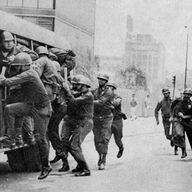On the evening of the 2nd of October, 1968, the Plaza de las Tres Culturas in Tlatelolco, Mexico City, became the site of a brutal crackdown that would be remembered as one of the darkest moments in contemporary Mexican history. As thousands of students, workers, and civilians gathered for a peaceful demonstration against government repression as part of the Mexican Student Movement of 1968, soldiers from the Secretaría de la Defensa Nacional (SEDENA) suddenly surrounded the square. Members of Batallón Olimpia, disguised among the crowd, fired the first shots, triggering a coordinated assault by the Mexican Army. Panic ensued as soldiers and secret police opened fire, their bullets cutting through the mass of unarmed demonstrators. Bodies piled up amidst the chaos, while helicopters shone spotlights onto the plaza, ensuring that no one could escape unseen. The government sealed off the area, and throughout the night, troops swept the site, executing survivors, dragging away bodies, and arresting thousands. The exact death toll remains unknown, though estimates range from the official count of 26 to over 300, with countless more detained, tortured, or disappeared.
The massacre was part of a broader campaign to silence political dissent ahead of the 1968 Mexico City Olympic Games, as President Luis H. Álvarez’s government sought to present an image of stability to the world. While state media swiftly blamed "armed provocateurs," international and independent journalists exposed the covert operation and the premeditated nature of the attack. News of the massacre sent shockwaves across Latin America and beyond, fuelling fears of a growing authoritarian undercurrent in Mexico’s so-called democratic transition. While the regime sought to erase the event from public consciousness, it instead became a rallying cry for generations to come—a symbol of state brutality and impunity. In the years that followed, the Tlatelolco Massacre would remain an open wound in the Mexican political landscape.
However, as bloody as it was, it would soon be overshadowed by a much greater tragedy.
